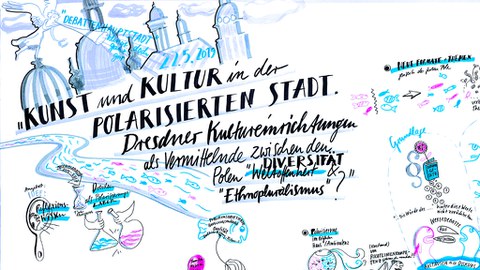Jun 18, 2020
Polarisation "moves" the cultural institutions in Dresden
Results of the project "Kunst und Kultur in der polarisierten Stadt"
Polarisation "moves" the cultural institutions in Dresden. This is one result of the project „Kunst und Kultur in der polarisierten Stadt“ (KupoS). The head of the research project Prof. Dr. Heike Greschke explains: "Our research has shown that new and broader networks have emerged. These are set up differently from earlier series of events organised under the umbrella of the Forum 13. Februar or as part of the Intercultural Days. The new networks work more continuously and act together to position themselves publicly as a strong alliance together with many other actors." However, the study also shows that against the backdrop of an increasingly polarising debate landscape, art and culture want to contribute to mediation, but "their attempts at mediation easily get caught in the maelstrom of polarisation and thus unintentionally contribute to sharpening the opposing positions on each other. Instead of talking to each other, they talk against each other and the opponents on stage secure each other's public attention," explains Prof. Dr. Heike Greschke.
To spell out the different views, ways of thinking and opinions artistically, to think them through to the end, to question them in terms of their contradictions and the concrete possibilities of life, could be an alternative task of art and culture in polarisation. This should not be done from a mediating position. With artistic methods, the different positions can be illuminated, in their contradictions and polyphony, but also the commonalities between the seemingly irreconcilable poles can be brought onto the stage and put up for public discussion.
The project „Kunst und Kultur in der polarisierten Stadt“ (KupoS) was carried out at the Centre for Integration Studies at TU Dresden between June 2018 and May 2019. KupoS took the polarisation tendencies that have become apparent in society as a whole in recent years as an opportunity to examine the role of art and culture in the process of social understanding.
The city of Dresden served as a "polarisation laboratory" and formed the centre of the analysis. In Dresden, media-enhanced processes of transition from experienced individual disadvantage to collective public protest can be observed very well in condensed form. Firstly, in a methodologically plural research design, possible changes in cooperation structures and the setting of topics in art and cultural institutions were investigated on the basis of selected events and event series in the period from 2014 to 2017. For example, the picture controversy about the representation of GDR art in the Dresden Art Collections, or the literature controversy, triggered by the bookseller Susanne Dagen from Dresden, developed a particular polarisation dynamic in the city.
Secondly, the example of the exhibition „Rassismus. Die Erfindung von Menschenrassen“ at the Deutsches Hygienemuseum Dresden (DHMD), the institutional handling of conflictual topics was examined.
The final report of the project has now been published in the series „Theoretische Beiträge des Zentrums für Integrationsstudien“ (Volume 2) in online and open access format. The publication is available at https://nbn-resolving.org/urn:nbn:de:bsz:14-qucosa2-707892.
Centre for Integration Studies at the TU Dresden: https://tu-dresden.de/zfi
Information for journalists:
Prof. Heike Greschke
Tel.: 0351 463-37370

